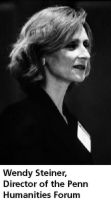
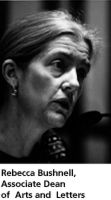
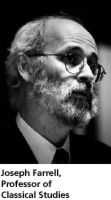
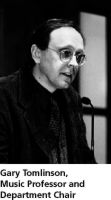
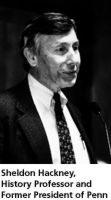
Bringing Ideas to Life
The Penn Humanities Forum
The legislation establishing the National Endowment for the Humanities states that "[d]emocracy demands wisdom and vision in its citizens." Leadership, it affirms, cannot rest solely upon wealth and power; it demands the kind of education that makes citizens the "masters of their technology and not its unthinking servants."
For a government that typically looks to technical experts for guidance, this is a striking declaration. It points to an essential source of knowledge and experience--the humanities--that must inform those who lead as well as those who are governed, if they are to choose wisely and in a way that fosters our aspirations to freedom.
"Certainly we recognize that nothing is more fundamental to the life of a great academic institution than the humanities," declared Penn president Judith Rodin, C'66. She was one of several speakers at the February 18 inaugural ceremony for the Penn Humanities Forum. The kickoff event featured a keynote address by NEH chairman Bill Ferris, Gr'69.
The purpose of the Penn Humanities Forum is to interject humanistic perspectives in the sciences, the professions, and in the public arena. Professor Wendy Steiner, director of the new initiative and chair of Penn's English Department, emphasizes the Forum's unique mission of nurturing collaborations between the University and the cultural and educational institutions of Philadelphia. "The conventional humanities center is a place that brings in major scholars, which tends to benefit the people who do this kind of humanities research." She hopes the Penn Humanities Forum will change that. While part of its mission is to foster interdisciplinary collaboration across the University's departments and schools, Steiner says "the idea is to stop humanities scholars from speaking only to themselves--to show the validity, the richness of humanistic learning to the general public."

Traditionally, the distance separating the ivory tower and the "real world" has been cultivated by the academy and accepted by the public. "We're not content to just go on fulfilling the same role of a research university," says Rebecca Bushnell, associate dean for arts and letters and a professor of English. "We're redefining that role. In the twenty-first century, the research university has to take public responsibility seriously, and this kind of public collaboration will help us take this step forward."
To achieve its integrated research, education, and public mission, the Penn Humanities Forum will develop a calendar of events centered on an annual theme. The theme for the 1999-2000 academic year is human nature. Events will include lectures and seminars led by world-class scholars, a cross-disciplinary team-taught course on the annual topic that will be open to the general public, and a major cultural program that includes exhibits, lectures, and other educational programming that links the resources of the University with local museums, galleries, theaters, libraries, and other institutions in the city.
On March 26-27, the Forum sponsored A Celebration of Philadelphia Writers, which knitted together an array of events on campus and across Philadelphia. The two-day fete of readings, book signings, lectures, discussions, and literary tours was an illuminating and entertaining experience that put attendees in touch with Penn faculty and other educators, and over 60 local writers who are part of a tradition that extends back to the literature created by Edgar Allen Poe and the composition of the Declaration of Independence. Besides campus departments and organizations, the celebration drew upon local radio stations, bus and trolley companies, historical sites, a jazz club, cafes, the Arden Theatre Company, the American Philosophical Society, the Free Library, the Franklin Inn Club, the Library Company, the Rosenbach Museum and Rare Book Library, and other organizations. "Center City vibrated with enough literary activity to satisfy anyone," wrote a book critic for the Philadelphia Inquirer.
Bushnell notes that the humanities encompass a substantial part of undergraduate study for students from all Penn schools. In addition to developing important communication and critical thinking skills, she says the humanities impart an indispensable perspective for students entering upon their professional lives. One of Bushnell's "best" undergraduate students was an English major on a pre-med track. "She knew from the very beginning she wanted to be a doctor," recalls Bushnell, "but she also loved English literature. I think for her it was through her study of literature that she came to a way of understanding people, which completely informed everything she learned as a doctor. You can understand the science of the human body, but that's only one small piece of what it means to understand what a person is. The two, for her, were completely inseparable."
More than ever, our society must respond to critical questions posed by scientific advancements that spawn new technology. How should we care for the terminally ill whose lives can be sustained indefinitely with medical machinery? What are the legitimate uses for genetic discoveries that will improve the human condition? Indeed, what does it mean to be human? "The humanities are one of the central places in our culture--and have been such a place for many centuries--where we negotiate and renegotiate fundamental questions about what it means to be human," said music professor and department chair Gary Tomlinson.
The humanities are not just a cache of academic disciplines, the "arts" in Arts and Sciences. History professor Sheldon Hackney, former Penn president and prior NEH chairman, defined the humanities as "what we think about ourselves, what we see as admirable behavior in others, what we think it means to be human, what we recognize as the human condition, what we learn from the human experience and human thought, what we accept as the purpose of life, what we define as a just society, what we decide that we owe to each other, what we understand as the way the world works." These are not simply matters of idle curiosity and arcane academic endeavor, he went on to say, "they are fundamentally important for each and every one of us."
Today, we need the wise counsel of humanists, perhaps even more than the expertise of engineers, scientists, and business entrepreneurs. In his presentation at the inauguration event, classics professor Joe Farrell construed the humanities not as a torch set aflame during some golden age of classical antiquity and then passed down to us to illuminate our way. He called humanistic inquiry "a hot seat for the complacent," pointing out that Socrates would on occasion spend time at the Athenian wrestling cage, which in ancient Greece was called the palestra. "Well, Penn has one of those," he said, "and I take this coincidence to be a good omen, in two ways: both as a sign that the Penn Humanities Forum will be a place where principals struggle with the most basic questions that we have, do, and will face as a society and as confirmation of the fact that this institution offers a place that is uniquely well suited for such an enterprise to flourish."